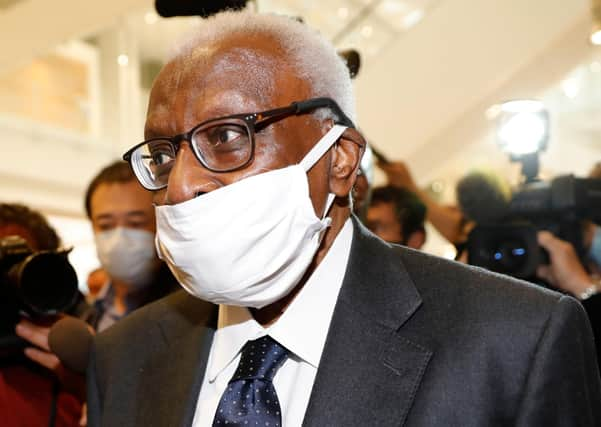Ex-IAAF chief on trial over London 2012 doping cover-ups


Fomer IAAF president Lamine Diack and others have gone on trial in Paris facing allegations of doping cover-ups and illicit payoffs at the very top of athletics.
In six days of hearings, the Paris court will weigh evidence that Russian athletes paid millions of dollars to hide their suspected doping so they could compete at the London Olympics in 2012 and other competitions. Seized documents suggested that athletes paid to have doping charges buried or delayed.
Advertisement
Hide AdAdvertisement
Hide AdThis was dubbed “full protection,” the court president said, outlining the case with tentacles stretching from Europe to Asia and Africa.
Diack, 87, who served as president of the governing body for nearly 16 years, is one of the alleged recipients of the payments.
The court briefly considered but rejected a request from a lawyer for Papa Massata Diack, one of Diack’s sons who is also a defendant in the case, that the trial be delayed because two of his lawyers weren’t able to attend the trial because of travel restrictions.
The trial had already been delayed from January to allow the inclusion of new evidence.
Papa Massata Diack lives in Senegal, shielded from an international arrest warrant issued by France, and did not attend the hearing.
As IAAF president, Diack was one of the most influential men in Olympic sports, presiding over an era when Usain Bolt made track and field wildly popular. But Diack’s legacy, and the IAAF’s credibility, was badly damaged when he was arrested in France after he stepped down in 2015.
Investigators revealed accusations of athletes being squeezed for payments to cover up their doping cases. A Russian marathon runner told investigators that she alone paid £400,000, a large chunk of which was subsequently refunded to her when she was later banned from competing despite the alleged pay-off.
Diack is being tried for corruption, money laundering and breach of trust. Prosecutors say he directly or indirectly solicited £3 million from athletes suspected by the IAAF of doping, who paid to have their names cleared so they could continue competing. About two dozen Russian athletes were reportedly involved.
Advertisement
Hide AdAdvertisement
Hide AdProsecutors have also charged Diack for involvement in a £1.2m payment from Russia for use in electoral politics in his native Senegal. Prosecutors say the money was creamed off sponsorship and TV rights deals, negotiated with Russian officials. Prosecutors say the money was to finance presidential and legislative election campaigns in Senegal in 2012, in exchange for slowing down doping cases targeting Russian athletes.
Diack is also accused of enabling his son to embezzle IAAF sponsorship revenue from Russia’s VTB Bank, Chinese oil firm Sinopec and broadcaster CCTV, South Korean tech giant Samsung and others.
Papa Massata Diack also faces corruption, money laundering and breach of trust charges. Senegal has refused France’s extradition requests for the former IAAF marketing consultant.
Lamine Diack was detained on a trip to France in 2015 and has been forbidden from leaving the country since.
Also being tried for corruption are a lawyer who advised Diack, Habib Cisse, and a doctor, Gabriel Dolle, who oversaw drug-testing at the IAAF and is accused of taking payments to delay doping cases. Both men were in court.
Two Russians are also on trial but were not present: Valentin Balakhnichev, a former IAAF treasurer, and Alexei Melnikov, a coach who led Russia’s long-distance running program.
A message from the Editor:
Thank you for reading this story on our website. While I have your attention, I also have an important request to make of you.
With the coronavirus lockdown having a major impact on many of our advertisers - and consequently the revenue we receive - we are more reliant than ever on you taking out a digital subscription.
Advertisement
Hide AdAdvertisement
Hide AdSubscribe to scotsman.com and enjoy unlimited access to Scottish news and information online and on our app. With a digital subscription, you can read more than 5 articles, see fewer ads, enjoy faster load times, and get access to exclusive newsletters and content. Visit https://www.scotsman.com/subscriptions now to sign up.
Our journalism costs money and we rely on advertising, print and digital revenues to help to support them. By supporting us, we are able to support you in providing trusted, fact-checked content for this website.
Joy Yates
Editorial Director
Comments
Want to join the conversation? Please or to comment on this article.